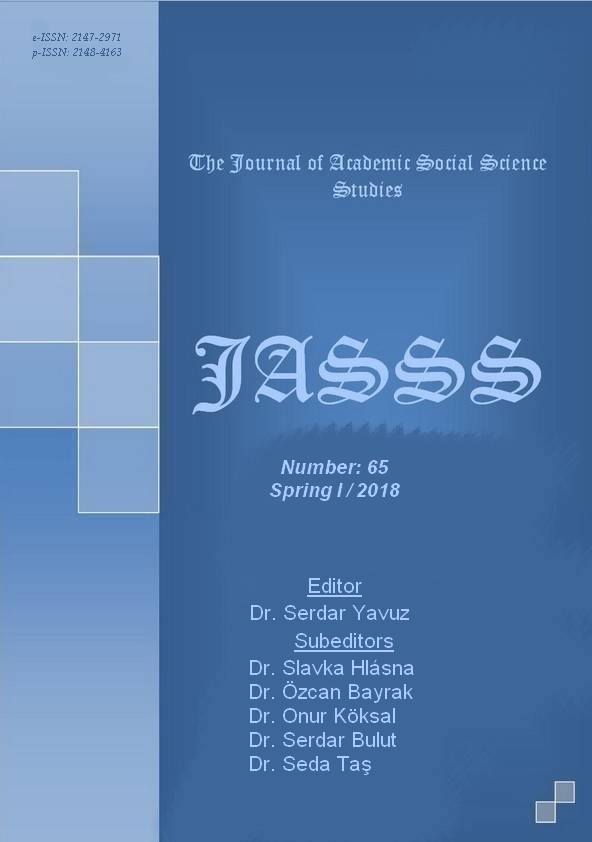Author :
Abstract
Bu çalışmada Fitzgerald'ın romanı Muhteşem Gatbsy, Amerikan Rüyası’nın yıkılışı ve 1920'lerin Amerika Birleşik Devletleri’ndeki tüketiciliğe odaklanılarak incelenmiştir. Yazarın hayatı ve dönemin sosyal durumunun romanın kendisi ile uyumu göz önünde bulundurularak ahlaki boşluk ve maddeci toplumun ikiyüzlülüğü ele alınmıştır. Muhteşem Gatbsy dramatik bir sosyal ve politik değişim dönemi olan ve ekonomik refah, şehirlerin yükselişi, sınıf yapısında değişimler, ilerleyen teknoloji, sosyal gelenekler ve kültürel adetlerin sarsılmasını beraberinde getiren Caz Çağını eleştirir. Romanın temel temalarından biri burjuva ve aristokrasi arasındaki sınıf ayrımdır. Roman o dönemin sosyal yaşamı ve sosyal statünün belirleyicileri ile maddi zenginliğin nasıl elde edildiği üzerinde durmaktadır. Romanın bir başka önemli özelliği de mallar ve değişim değerlerinin tüketicinin toplumsal statüsünü ortaya koymasıdır. Fitzgerald metalaşmayı gösterek kapitalist ideolojinin etkisini eleştirmektedir. Fitzgerald aşırı tüketiciliğe yol açan para eşittir mutluluk yanılgısını göstererek kapitalist ve materyalist toplumun yozlaşmasını romanın başkahramanı olan Gatsby’nin muazzam bir zenginliğe erişmesi ve sonunda yıkımı ile gözler önüne sermiştir. Kapitalist ideolojinin yarattığı yanılsamadan dolayı fantezi ve gerçekliği birbirine karıştıran Gatsby, Althusser'in terminolojisine göre söylenecek olursa burjuva sisteminin sosyal aparatlarınınının bir kurbanı olmuştur. Bu makale, Fizgerald’ın sergilediği bu dönemdeki sosyal ayrımcılık, eşitsizlik ve ahlaki çürümeyi irdelemektedir. Para Gatsby için karşılığında her şeyi değiştirebileceğini sandığı bir yanılsama ve yapay bir dünya yaratır ve sahip olduğu malları arasında paranın insan üzerindeki yabancılaştırıcı gücü konusunda Marx'ın düşünceleri ile örtüşen bir yabancılaşma yaşar.
Keywords
Abstract
In the present study Fitzgerald’s novel The Great Gatbsy was examined focusing on the destruction of the American Dream and the consumerism of the 1920's in the United States. The moral emptiness and hypocrisy of this materialistic society was scrutinized while considering the author’s life and era’s social condition’s which are coherent with the novel itself. The Great Gatsby critiques the Jazz Age, an age of dramatic social and political change which brings along economic prosperity, the rise of cities, changes in class structure, advancing technology, and a shaking up of social mores and cultural conventions. One of the principle theme of the novel is the class distinction between the bourgeois and the aristocracy. The novel focuses on the social life at the time and the determinants of social status, how material wealth is achieved. The commodities and their exchange value reveals the social status of its consumer which is another important feature of the novel. Fitzgerald criticizes the effect of capitalist ideology through its representation of commodification. Fitzgerald revealed the misconception of money equalls happiness which led consumerism and presents the corruption of capitalist and materialist society exhibiting the novel’s protagonist - Gatsby’s rise to immense wealth and his destruction in the end. Gatsby became a victim of the social apparatus of bourgeois system in Althusser’s terms who mistakes fantasy for reality because of the illusion created by the capitalist ideology. This paper explores social discrimination, unequality and moral decay in the era which Fizgerald displays. Money creates an artificial world, an illusion for Gatsby which he thinks he can exchange everything in return and he experiences an alienation among his possessions which coincides with Marx’s thoughts regarding money’s alienating power over human.





